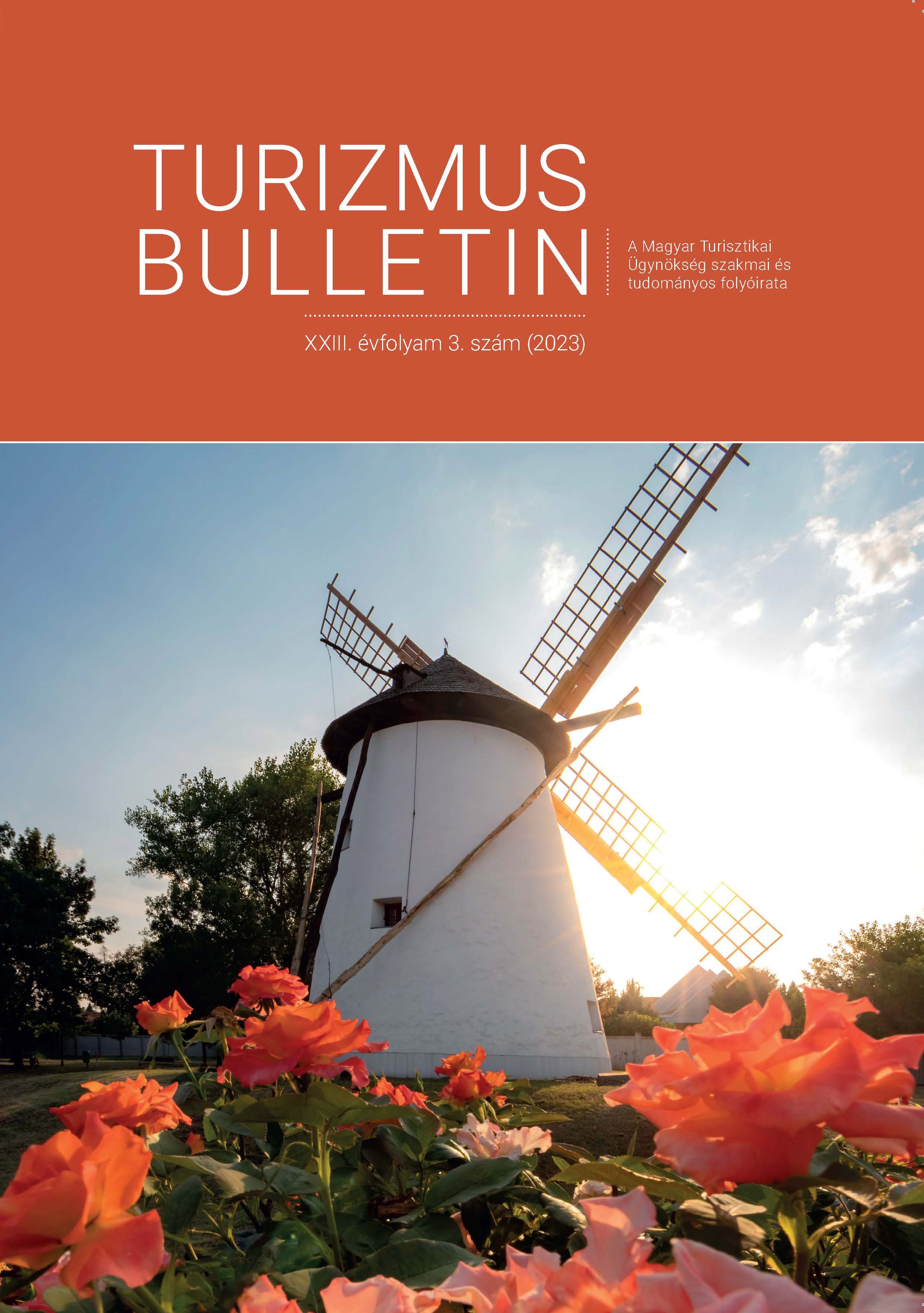Changes in tourism mobility in the Covid19-pandemic and the post-pandemic period in terms of transport mode and destination choice
DOI:
https://doi.org/10.14267/TURBULL.2023v23n3.3Keywords:
travel preferences, destination choice, mobility, post-pandemic, economic recessionAbstract
The relationship between tourism and mobility is strongly shaped by health safety and the economic and social impact of the war. Our empirical research investigated these factors through an online questionnaire survey within the Hungarian population. A comparative statistical analysis was used to investigate the evolution of travel patterns and tourism mobility based on trips undertaken in 2021, 2022 and planned for 2023. The results show that, despite the closures and restrictions, wanderlust has not decreased. However, there has been a marked change in customer decisions, mainly in terms of the geographical distance of the chosen destination, its safety and the means of transport used to get there. This has been further exacerbated by the dramatic price increases caused by the Russian-Ukrainian war, with economizing and cost optimization being prioritized in decision making. This has resulted in much more restrained tourism mobility for the subjects’ travel plans in 2023.
References
ANGHEL, V. – JONES, E. (2022): Is Europe Really Forged Through Crisis? Pandemic EU and the Russia-Ukraine War. Journal of European Public Policy. 30(4). https://doi.org/10.1080/13501763.2 022.2140820
BEHRINGER ZS. – HINEK M. – TEVELY T. (2022): Biztonság és higiéné, mint a legfontosabb hívószavak – Szabadidős utazások kompromisszumokkal a világjárvány alatt. V. Zalaegerszegi Egészségturizmus Konferencia. Konferenciakötet. pp. 21–34.
CSÓKA L. – PAIC R. – PRISZTÓKA GY. – VARGÁNÉ SZ. K. – VARGA T. – MARTON G. (2021): A hazai utazási szokások változásai a koronavírus-járvány hatására. Turisztikai és Vidékfejlesztési Tanulmányok. 6(4). pp. 16–27.
ERNSZT I. – MARTON ZS. – TÓTH D. (2022): Szárnyalás és zuhanórepülés. A légi közlekedés és a koronavírus-járvány. In: Michalkó G. – Németh J. – Birkner Z. (szerk.): Turizmusbiztonság, járvány, geopolitika. Bay Zoltán Alkalmazott Kutatási Közhasznú Nonprofit Kft, Budapest. pp. 53–70.
FOTIADIS, A. – POLYZOS, S. – HUAN, T. C. T. (2021): The good, the bad and the ugly on COVID-19 tourism recovery. Annals of Tourism Research. 87. 103117. https://doi.org/10.1016/j. annals.2020.103117
FUSTÉ-FORNÉ, F. – MICHAEL, N. (2020): Limited Tourism: Travel Bubbles for a Sustainable Future. Journal of Sustainable Tourism. 31(1). pp. 73–90. https://doi.org/10.1080/09669582.2021.19 54654
GONDA T. (2022): Turizmus és reziliencia. Turizmus Bulletin. 22(2). pp. 27–36. https://doi. org/10.14267/TURBULL.2022v22n2.3
HALL, C. M. – SCOTT, D. – GÖSSLING, S. (2020): Pandemics, transformations and tourism: Be careful what you wish for. Tourism Geographies. 22(3). pp. 577–598. https://doi.org/10.1080/14616 688.2020.1759131
IANQUITO, B. L. (2020): Tourist as Vector: Viral Mobilities of COVID-19. Dialouges in Human Geography. 10(2). pp. 174–177. https://doi. org/10.1177/2043820620934250
KARL, M. (2018): Risk and Uncertainty in Travel Decision-Making: Tourist and Destination Perspective. Journal of Travel Research. 57(1). pp. 129–146.
KÖKÉNY L. – KENESEI ZS. (2022): A Covid19- pandémia jelentette félelmek hatása a nyaralás tervezése során felmerülő kockázatészlelésre. Turizmus Bulletin. 22(3). pp. 4–11. https://doi. org/10.14267/TURBULL.2022v22n3.1
KUPI, M. – SZEMERÉDI, E. (2021): Impact of the COVID-19 on the destination choices of Hungarian tourists: A comparative analysis. Sustainability. 13(24). 13785. https://doi. org/10.3390/su132413785
MAURYA, P. K. – BANSAL, R. – MISHRA, A.K. (2023): Russia–Ukraine Conflict and its Impact on Global Inflation: An Event Study-Based Approach. Journal of Economic Studies. Ahead-of-print. https://doi.org/10.1108/JES-01-2023- 0003
MICHALKÓ G. – NÉMETH J. – BIRKNER Z. (2022): Lezárástól az újraindulásig: a COVID19 járvány hatása a magyar lakosság utazásaira és a turizmusbiztonsággal kapcsolatos percepcióira. In: Michalkó G. – Németh J. – Birkner Z. (szerk.): Turizmusbiztonság, járvány, geopolitika. Bay Zoltán Alkalmazott Kutatási Közhasznú Nonprofit Kft, Budapest. pp. 115–128.
MISKOLCZI M. – BAUER B. – DÉRI A. – KOVÁCS T. (2021): Mobilitási szokások változásai a Covid19-világjárvány idején. Turizmus Bulletin. 21(3). pp. 24–33. https://doi.org/10.14267/ TURBULL.2021v21n3.3
NEUBURGER, L. – EGGER, R. (2021): Travel risk perception and travel behaviour during the COVID-19 pandemic 2020: A case study of the DACH region. Current Issues in Tourism. 24(7). pp. 1003–1016. https://doi.org/10.1080/13683500 .2020.1803807
RAFFAY Z. (2020): A COVID-19 járvány hatása a turisták fogyasztói magatartásának változására. In: Ercsey I. (szerk.): Marketing a digitalizáció korában. Az Egyesület a Marketing Oktatásért és Kutatásért XXVI. Országos konferenciájának előadásai. Széchenyi István Egyetem, Győr. pp. 347–356.
TÖRŐCSIK M. – CSAPÓ J. (2021): A turisztikai trendek csoportosítása. In: Csapó J. – Végi Sz. (szerk.): A globális, lokális és a glokális turizmus jelenlegi szerepe és jövője elméleti és gyakorlati megközelítésben. PTE KTK Marketing és Turizmus Intézet. pp. 11–15.
YANG, M. – HAN, C. – CUI, Y. – ZHAO, Y. (2021): COVID-19 and Mobility in Tourism Cities: A Statistical Change-Point Detection Approach. Journal of Hospitality and Tourism Management. 47. pp. 256–261. https://doi.org/10.1016/j. jhtm.2021.03.014
YU, L. – ZHAO, P. – TANG, J. – PANG, L. (2023): Changes in Tourist Mobility after COVID-19 Outbreaks. Annals of Tourism Research. 98. 103522. https://doi.org/10.1016/j. annals.2022.103522
Internetes források
KSH (2023): A turizmus és vendéglátás fontosabb adatai 2001-2022. https://www.ksh.hu/stadat_files/ tur/hu/tur0001.html Letöltve: 2023. június 18.
KSH (2020a): Turizmus-szatellitszámlák, 2019-2020. https://www.ksh.hu/docs/hun/xftp/idoszaki/turizmszatt/2019/index.html#2019bentovbbbvltaturisztikaikereslet Letöltve: 2023. június 18.
KSH (2020b): Helyzetkép a turizmus, vendéglátás ágazatról, 2019. https://www.ksh.hu/docs/hun/ xftp/idoszaki/jeltur/2019/index.html#alakossgbelflditurisztikaiutazsai Letöltve: 2023. augusztus 21.
UNWTO (2023): UNWTO World Tourism Barometer, Vol. 21, Issue 1. https://webunwto.s3.euwest-1. amazonaws.com/s3fs-public/2023-01/ UNWTO_Barom23_01_January_EXCERPT. pdf?VersionId=_2bbK5GIwk5KrBGJZt5iNPAGnrWoH8NB Letöltve: 2023. június 18.
UNWTO (2020): UNWTO World Tourism Barometer and Statistical Annex, January. https:// www.e-unwto.org/doi/epdf/10.18111/wtobarometereng.2020.18.1.1?role=tab Letöltve: 2023. június 18.

